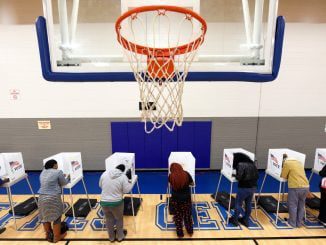
RALEIGH — As Election Day approaches, the battle for control of the North Carolina General Assembly isn’t in question. Both Democrats and Republicans expect the GOP to remain in control of the state legislature, as they have been since sweeping into power in 2011.
The question this year is whether Republicans can regain veto-proof supermajorities in both chambers. To achieve that goal, Republicans need to win 72 seats in the House and 30 in the Senate.
“I’m not personally on the ballot,” Democratic Gov. Roy Cooper told The Atlantic in a recent interview. “My ability to stop bad legislation is. The effectiveness of the veto is on the line.”
Since taking office in 2017, Cooper has issued a record 75 vetoes; more than double the number issued by all past governors combined. When Republicans held supermajorities in both chambers during Cooper’s first term, 23 of Cooper’s 28 vetoes were overridden.
Democrats have 93 candidates and Republicans fielded 113 candidates for the 120 seat races. The number of Republicans running unopposed for House seats outnumbers Democrats 27 to seven.
Examples on the Republican side include Richmond County’s Ben Moss, who won the primary for House District 52 and will assume the seat since there is no Democratic challenger. The same is true for Republican Jake Johnson of Polk County in House District 113. For Democrats, Guilford’s District-61 Rep. Pricey Harrison is unopposed as Wake County’s D-11 Rep. Allison Dahle.
There are 14 Republicans on the Senate side have no challenger and the party has fielded candidates in all 50 districts except one – the District 38 seat held by Sen. Mutjaba Mohammed of Charlotte. Democrats, including Mohammed, have 36 candidates in the running out of 50 seats.
The NC Free Enterprise Foundation (NCFREE) compiled partisan index rankings for the legislative districts.
The competitive districts, which Republicans need to win, have rankings with small lean ratings of either a +1 or +2. In some districts, the rating is an unclear advantage of a +0 that NCFREE has attributed to one party or another.
NCFREE ranks 14 House districts as competitive. Four that slightly lean Republican (Districts 12, 35, 59, and 112) and six that lean slightly Democrat (Districts 2, 5, 18, 36, 54, and 105). The remaining four (Districts 9, 25, 40, and 63) have no clear advantage.
A fundraising email from the N.C. House Republican Caucus lists five races it believes can flip from Democratic control to Republicans: Districts 9 (Pitt County), 24 (Wilson County), 35 (Wake County), 63 (Alamance County), and 103 (Mecklenburg County).
For the Senate, NCFREE rates seven races as competitive. Two have a small Democrat lean (Districts 11 and 21) while four have a Republican lean (Districts 4, 7, 17 and 18). District 42 is ranked as having no clear party advantage.
Civitas Partisan Index (CPI) analysis generally lines up with NCFree’s ratings for both chambers with some differences.
According to the CPI ratings, 24 Senate Districts as either lean, likely, or safe Republican seats and 22 are lean, likely, or safe Democratic. The remaining four are toss-up seats with no clear party advantage.
In the House, CPI shows 38 districts that either lean, likely, or safe Republican and 56 that lean either lean, likely, or safe Democrat. Six are considered toss-ups with a slight Democrat lean.
CPI’s Senate races to watch for Republicans to capture a supermajority include five districts; 3, 11, 17, 18, and 42. Both District 17, Democrat Sydney Batch versus Republican Mark Cavaliero, and District 18, Democrat Mary Willis Bode versus Republican E.C. Sykes, are in Wake County. Gov. Cooper has intervened in the latter race, publicly endorsing Bode in a campaign ad.
Senate District 19 in Cumberland County between Republican Wesley Meredith and former Fayetteville City Council member Democrat Val Applewhite may be interesting as well given Gov. Roy Cooper was criticized for his intervention in that district. Cooper seemingly punished incumbent Democrat Kirk deViere by endorsing Applewhite in the May primary. NCFREE rates the district as a +8 Democrat lean whereas CPI rates it as a 6+ Democrat lean.



